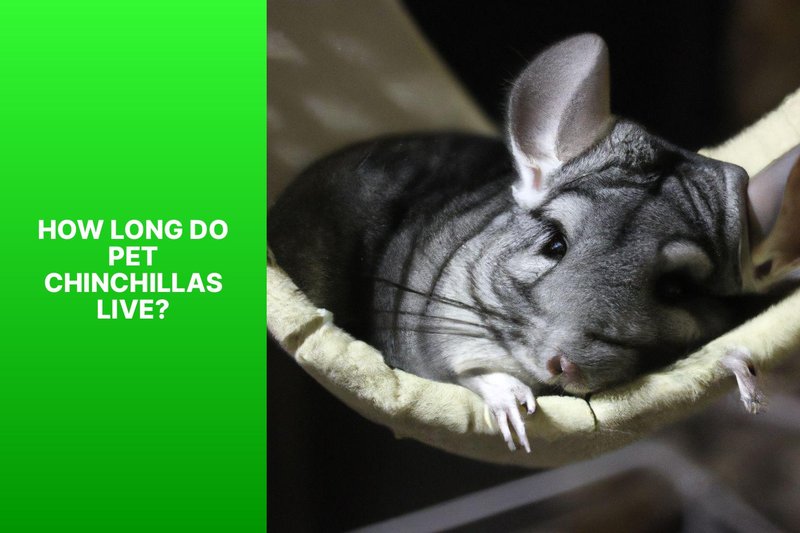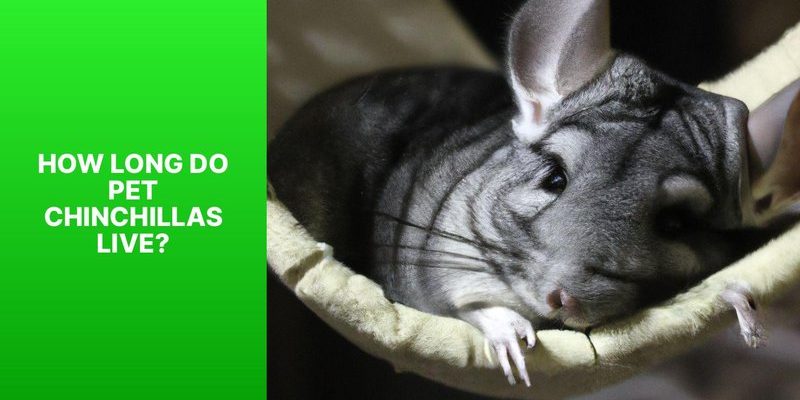
Understanding a chinchilla’s lifespan can feel a bit like unraveling a mystery. Imagine this: you’re in a cozy café, sipping your favorite drink, and discussing everything you love about your chinchilla. Suddenly, someone asks, “How long do they live?” It’s essential to know the answer, not only to prepare for the delightful years you’ll spend with your furry friend but also to understand their health and well-being as they age. Let’s dive in!
The Average Lifespan of Chinchillas
Chinchillas typically live anywhere from 10 to 15 years in captivity. Some lucky ones can even reach up to 20 years with proper care. This lifespan is quite impressive compared to other small pets. For instance, guinea pigs live about 4 to 6 years, while hamsters might only make it to 2 to 3.
Why do chinchillas have such longevity? It’s often thanks to their specialized diet, environment, and care. Chinchillas are originally from the Andes mountains, where harsh conditions have shaped them into hardy little survivors. In captivity, they thrive with a diet rich in hay and pellets, alongside regular interaction and a safe living space. Think of it as giving them the best seat in the house; the better their habitat, the longer they’ll stay with you!
Factors Influencing Their Lifespan
Several factors can play a significant role in how long your chinchilla might live. Here are a few key points:
- Diet: A balanced diet rich in hay, high-quality pellets, and occasional treats can help keep your chinchilla healthy.
- Environment: A spacious, clean cage with proper ventilation and bedding can reduce stress and illness.
- Veterinary Care: Regular vet check-ups can catch health issues early and prolong your pet’s life.
- Social Interaction: Chinchillas are social animals. Regular playtime can keep their spirits—and health—up.
Here’s the thing: just like humans, chinchillas can face health challenges as they age. Obesity, dental issues, and respiratory problems are common concerns if not managed properly. So, keeping an eye on their habits and health is crucial.
Common Signs of Aging in Chinchillas
As your chinchilla ages, it’s essential to recognize the signs that they might be getting up there in years. Some of these signs can be subtle, while others are more obvious. Here’s what to watch for:
1. Reduced Activity: Younger chinchillas are bundles of energy. If your pet starts to slow down and prefers lounging instead of jumping around, that might be a signal that they’re aging.
2. Changes in Eating Habits: If your chinchilla suddenly loses interest in their favorite snacks or stops eating as much, it’s time to pay attention. Aging chinchillas may have dental issues making it hard for them to chew.
3. Altered Fur Condition: A chinchilla’s fur is usually soft and fluffy. If you notice it looking dull or clumpy, this might indicate changes in their health as they age.
4. Behavioral Changes: Older chinchillas may become less social or more reserved. Keep an eye on their interactions; a change in personality can often signal health changes.
Let me explain, keeping up with these signs allows you to provide your chinchilla with the best care possible as they enter their golden years.
Health Concerns as Chinchillas Age
Just like any pet, chinchillas can develop health issues as they age. Here are some common concerns and what you should know about them:
– Dental Issues: Chinchillas’ teeth grow continuously. Older pets are more likely to develop dental problems, which can affect their ability to eat. Look out for signs like drooling or weight loss.
– Obesity: As chinchillas get older, they might not be as active, leading to weight gain. You’ll want to monitor their diet closely and ensure they get enough exercise.
– Respiratory Problems: Chinchillas can be sensitive to their environment. If your pet shows signs of coughing, sneezing, or labored breathing, it’s essential to consult a vet.
– Arthritis: Just like people, older chinchillas can develop arthritis, making it harder for them to move around. You may need to adjust their living space to make it easier for them to get around.
Understanding these issues is crucial. Regular vet visits can help catch problems early, giving your chinchilla a better quality of life.
How to Extend Your Chinchilla’s Lifespan
Want to ensure your chinchilla lives a long, happy life? Here are some practical tips to help maximize their lifespan:
1. Provide a Balanced Diet: Focus on high-quality hay and pellets, and limit sugary treats. This will keep their digestive system healthy.
2. Create a Safe Environment: Ensure their cage is spacious with plenty of places to explore. Avoid placing their cage in drafts or direct sunlight.
3. Regular Vet Check-ups: Establish a relationship with a vet who understands chinchillas. Regular health check-ups can help catch any issues before they become serious.
4. Make Time for Interaction: Spend time playing with your chinchilla. Social interaction is vital to their mental well-being and can help keep them healthier.
Remember, every chinchilla is unique. What works for one may not work for another, so it’s essential to pay close attention to your pet’s individual needs.
The Joy of Being a Chinchilla Parent
Caring for a chinchilla can be one of the most rewarding experiences. Their quirky personalities and loving nature can bring a lot of joy into your life. Knowing how long they typically live and the signs of aging can help you prepare for each stage of their life.
As you embark on this journey, it’s essential to keep these tips in mind and foster a strong bond with your chinchilla. Regular attention and love can ensure you and your furry friend create lasting memories together, no matter how long their lifespan may be.
In the end, chinchillas can live long, fulfilling lives with the right care. Cherishing every moment with them is what truly matters!

